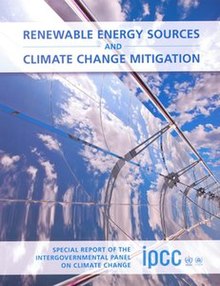 | |
| Author | Ottmar Edenhofer Intergovernmental Panel on Climate Change |
|---|---|
| Subject | Climate change mitigation, renewable energy |
| Publisher | Cambridge University Press |
Publication date | May 9, 2011 |
| ISBN | 9789291691319 |
| OCLC | 776940700 |
The United Nations Intergovernmental Panel on Climate Change (IPCC) published a special report on Renewable Energy Sources and Climate Change Mitigation (SRREN) on May 9, 2011.[1][2] The report developed under the leadership of Ottmar Edenhofer evaluates the global potential for using renewable energy to mitigate climate change. This IPCC special report provides broader coverage of renewable energy than was included in the IPCC's 2007 climate change assessment report, as well as stronger renewable energy policy coverage.[3]
In the present time, there is an obvious trend to have more renewable energy sources and therefore to overcome life crisis that can go when oil and gas expire.[4] Renewable energy can contribute to "social and economic development, energy access, secure energy supply, climate change mitigation, and the reduction of negative environmental and health impacts". Under favourable circumstances, cost savings in comparison to non-renewable energy use exist.[2]
- ^ Harvey, Fiona (2011-05-09). "Renewable energy can power the world, says landmark IPCC study". The Guardian. Archived from the original on 2011-05-14. Retrieved 2011-05-09.
- ^ a b "Special Report on Renewable Energy Sources and Climate Change Mitigation". Intergovernmental Panel on Climate Change. Archived from the original on 2011-05-10. Retrieved 2011-05-09.
- ^ REN21 (2011). "Renewables 2011: Global Status Report" (PDF). p. 51. Archived from the original (PDF) on 2011-09-05. Retrieved 2011-07-22.
{{cite web}}: CS1 maint: numeric names: authors list (link) - ^ Colak, Seyit (2020-07-28). "Importance of Renewable Energy Sources in terms of sustainability". energyworld360.com. Retrieved 2020-08-17.